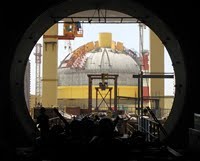Serious threats require serious action, and there is broad nonpartisan agreement that nuclear terrorism remains one of the most daunting threats of the 21st century. That is why national leaders from more than 50 countries will meet this week in Seoul, Korea, at the second Nuclear Security Summit to address nuclear terrorism. The 2010 Nuclear Security Summit in Washington helped catalyze new commitments by states to secure loose nuclear materials, and today more than 80 percent of these commitments have been accomplished. But these measures only go so far, because there is no globally agreed-upon standard for securing nuclear material, leaving us reliant on a patchwork of voluntary steps, bilateral agreements and unfunded mandates.
The past year delivered two reminders of the threat posed by unsecured nuclear material: one from Moldova and one from Japan. In Moldova, police broke up a nuclear smuggling ring that was looking to sell highly enriched uranium, which in sufficient quantities can be fashioned into an improvised nuclear device. It is believed that at least one member of the group remains at large and in possession of weapons-usable material. This incident is hardly unique. There have been 18 confirmed thefts or loss of weapons-usable nuclear material worldwide, and in many of these cases, no one knew the material was missing until it turned up in a police sting -- leaving us to wonder what else might be out there.
The other wake-up call came last March from Japan’s Fukushima prefecture. While the Fukushima Daiichi nuclear disaster resulted from equipment failures related to an earthquake and tsunami, it served as a reminder that complex systems, even those with multiple and redundant safety features, are prone to failure in the face of unexpected shocks. As such, Fukushima provided a new blueprint to terrorists, who no doubt realize that targeted sabotage could trigger the sorts of power outages and loss of coolant that brought down three reactors and created the worst nuclear disaster since Chernobyl. The after-action reports from Fukushima have focused on the need to strengthen nuclear safety, but we cannot forget that nuclear safety and nuclear security are intertwined. In both cases, stronger domestic and international controls are needed to ensure that the highest operating standards are always applied.

